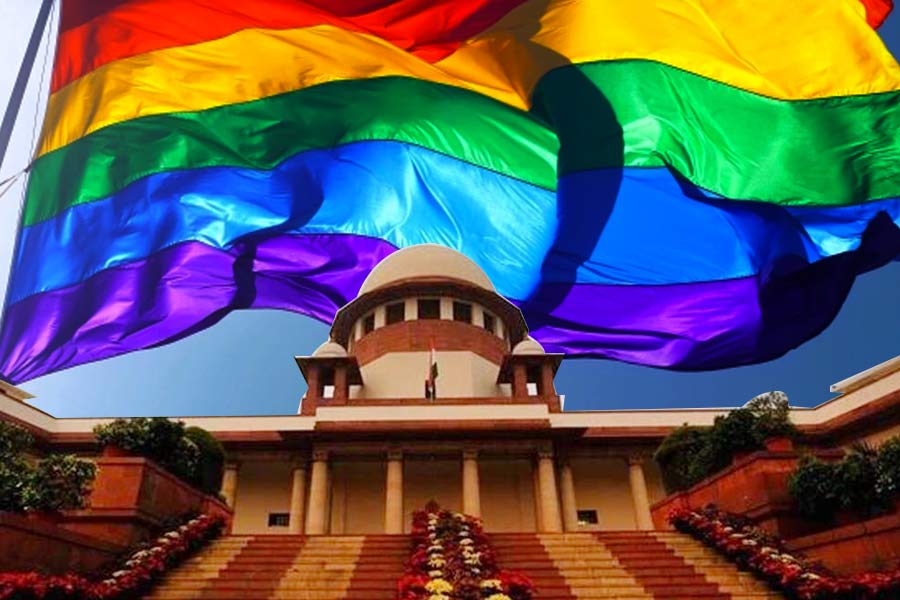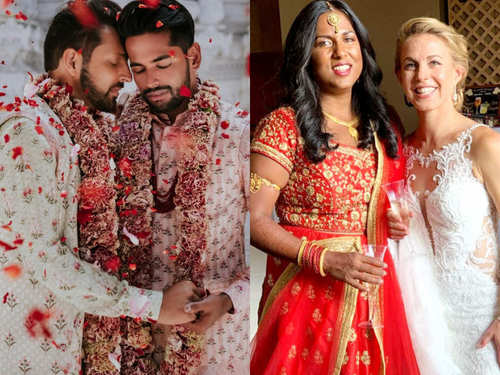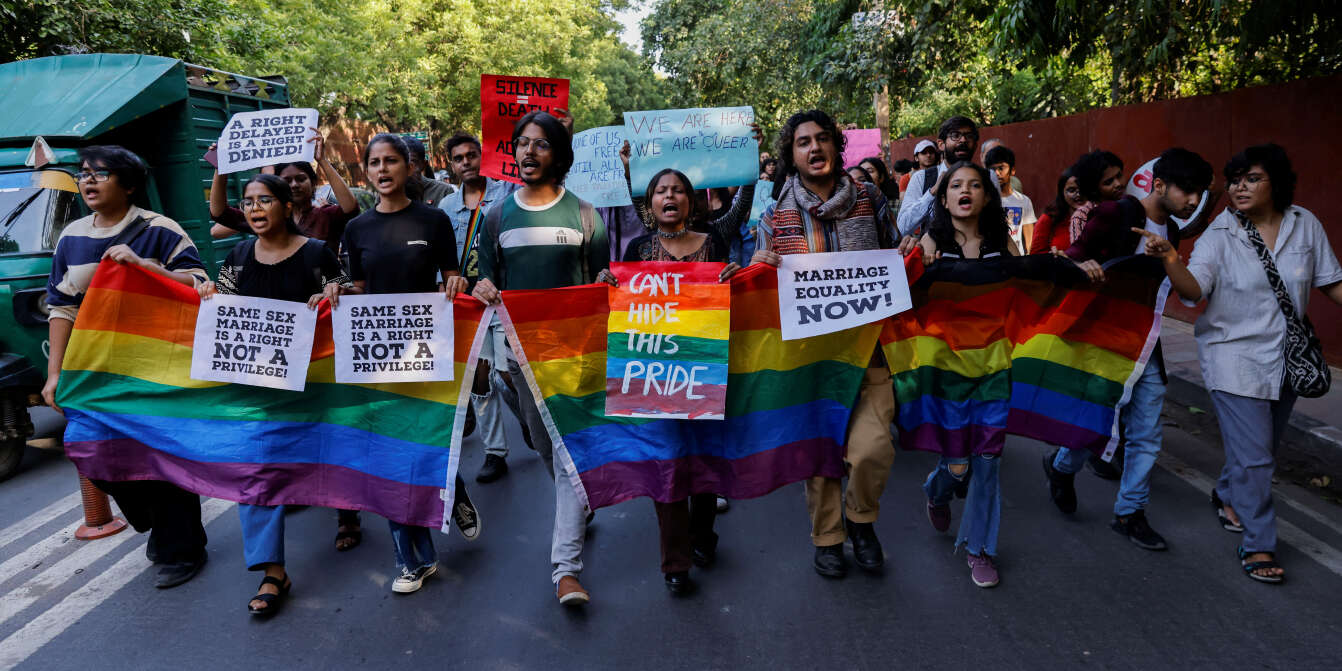
October 17, was a day of huge disappointment for the queer couples in India who had knocked on the doors of the Supreme Court pleading for the right to marry their loved ones, just like any other ‘normal’ citizen in the country. The petitioners and a significant proportion of citizens had laid high hopes for getting same-sex marriage rights on the five-judge bench led by Chief Justice DY Chandrachud (his leading the bench was the biggest source of optimism actually). However, even after a nearly month-long hearing, the court reserved its verdict only to announce a new set of disappointments for the petitioners four months later.
Concerns of Petitioners
Firstly, we need to understand what the petitioners were demanding and what the judgement exactly stated. It was not as if the petition was demanding some drastic reforms on the part of the Supreme Court. It only sought the ‘Special Marriage Act’ — which allows people from different faiths and religions to get married — to be amended.
The petitioners argued that by denying the LGBTQ community to marry, they are being violated of Article 14 (no Indian can be denied legal protection), Article 15 (prohibits discrimination based on caste, religion, and sex), Article 19 (freedom of speech and expression), Article 21 (no one can be defined for life and public liberty) and Article 25 (freedom of conscience).
It was not as if the LGBTQ community were demanding a whole new article inserted into the Constitution or demanded a huge act passed by the Parliament. All religious bodies — in a rare show of unity — had voiced against same-sex marriage. Knowing this, the petitioners only demanded the Special Marriage Act — which allows people from different faiths and regions to get married — to be amended and made ‘gender neutral’ by replacing ‘husband’, ‘wife’ and other gender-specific terms to replaced with gender neutral ones like ‘party’ or ‘spouse’.
In addition to this, the petitioners also demanded joint adoption and nominee rights as well as a series of “preventative, remedial, protective and punitive measures” for getting safety and protection to consulting same-sex couples “from their families”. At least, these things were some basic necessities that the queer couples needed at utmost priority. One can just imagine, the life queer couples would be living being unable to nominate property for their partners or taking insurance with them.

The five-judge bench that delivered the disappointing same-sex ruling (Photo: India Today)
The Major Observations of the Court
The apex court in a 3:2 ruling decided not to allow the queer couples to marry. The main point in the SC ruling was that it termed “marriage is not a fundamental right”. This very point, in my opinion, was almost the ‘game over’ for the petitioners. The court said that marriage is an institution set up under law and same-sex couples “don’t have the right to marry” unless the law “permits” them to do so. But, the minority judges (CJI and Kaul) did observe that there is recognition of the right to “human dignity, right to life and personal liberty”.
“The Constitution does not expressly recognise a fundamental right to marry…An institution cannot be elevated to the realm of a fundamental right based on the content accorded to it by law. However, several facets of the marital relationship are reflections of constitutional values including the right to human dignity and the right to life and personal liberty,” the court said.
Taking further look at the same-sex ruling, the majority opinion — by Justices Ravindra Bhat and Hima Kohli, and backed by a separate concurring judgment by PS Narasimha — said that an “entitlement” to legal recognition of the right to a union — marriage, civil union or regarding legal status upon the parties to the relationship — can “only be done through enacted law”.
Meanwhile, the minority opinion, of Chief Justice of India DY Chandrachud (one we had utmost faith in) and Justice Sanjay Kishan Kaul, said the LGBTQIA community “had a fundamental right to form relationships” and that the “state was obligated to recognise and grant legal status to such unions”, so that same-sex couples could also avail the material benefits provided under the law.
“Choosing a life partner is an integral part to decide one’s course of life. Some may regard this as the most important decision of their life. This right goes to the root of the right to life and liberty under Article 21,” the CJI said. “This court has recognized that queer couples can’t be discriminated upon. Material benefits and services flowing to heterosexual couples and denied to queer couples will be a violation of their fundamental right”.
Amendment of Special Marriage Act
In a major setback for same-sex couples, the apex court refused to amend the Special Marriage Act (SMA). The reason was two-fold. Firstly, the court said that it can’t hold SMA ‘void’ as it would take the country backwards leaving inter-caste and inter-marriage couples not in a position to marry. Secondly, the court said that it can’t “read words” into SMA by adding or deleting anything because of “institutional limitations” as that would “amount to judicial legislation”.
“Whether a change should be brought into the legislative regime of the SMA is for Parliament to determine,” the CJI said. “The Court in the exercise of the power of judicial review must steer clear of matters, particularly those impinging on policy, which falls in the legislative domain”.
“The court must exercise restraint and defer to the wisdom of the other branches of the state, which can undertake wide-scale public consultation, consensus building and reflect the will of the people, and be in their best interest,” Judge Ravindra Bhat from majority said.
Visuals of the protests demanding the right to marriage equality (Photo: Le Monde)
Adoption of Child
Another setback for same-sex couples was that they even failed to get the right to adopt children. Notably, in the earlier arrangement through the ‘Juvenile Justice Act 2015’, even a single parent had the right to adopt a child. This allowed same-sex couples to adopt children.
However, the Central Adoption Resource Authority (CARA) in 2022, issued certain regulations, which require “a couple to be in a two-year stable marital relationship to be eligible for adoption”. It also prohibits a person from adopting a child if that person is in a live-in relationship. Consequently, queer couples became ineligible to adopt. The petitioners sought help in this area urging the top court to amend the system.
While the CJI and Justice Kaul struck down the regulations and the circular for “violating the right to equality and non-discrimination”; the majority, led by Justice Bhat, found that the “judiciary was ill-equipped” to consider the potential impact of extending the right to jointly adopt children to queer couples. Once again, the matter was left to the executive and disappointment was all that came the way for queer couples.
But, it is pertinent to note a very important observation made by the court. Those opposing same-sex couples adopting children argued that queer people will be ‘unable’ to provide a stable upbringing to the child. On this, CJI Chandrachud said that there is “no material on record” to prove only a “married heterosexual couple” would be able to provide stability to the child.
Guidelines issued by the Court
When the SC failed to give what the petitioners, in a dire situation, were demanding, in what looked like saving from disgrace, the top court issued certain guidelines to ‘help’ the LGBTQ community. CJI Chandrachud listed guidelines namely; providing queer community access to goods and services, “sensitising” the public about queer identity as a natural thing, establishing hotline numbers and ‘safe houses’, ‘banning’ conversion therapy treatments regarding changing gender identity, and prohibiting inter-sex children from undergoing “forced operations” or any other “hormonal therapy”. He also urged the government to draft modules Mental Healthcare Act 2017 to assist mental health and reduce suicides among queers.
The top court also cited research conducted by the National Institute of Epidemiology which revealed that “law enforcement agencies are the largest perpetrators of violence against the transgender community”. The court asked the police not to “harass” the queer people and not force them to return to their natal families “if they do not wish to return to them” and ensure their protection from their families.
Notably, Solicitor General Tushar Mehta who was representing the government in the court, had stated that the Centre is ready to establish a ‘high-powered committee’ chaired by the Cabinet Secretary to set out the rights of the queer people. CJI Chandrachud recommended that this committee must include members of the queer community, and experts with knowledge of the “social, psychological and emotional” needs of the community. He also directed that it should hold consultative exercises with queer people before finalising the decisions. The CJI also recommended the committee to work for the succession rights, maintenance, financial benefits, family pension, insurance, joint bank accounts and ration cards for the queer partners.
The SC said the state may choose from several policy outcomes: They may make all marriage and family-related laws gender-neutral, or they may create a separate SMA-like statute in gender-neutral terms. They may pass an Act creating civil unions, or a domestic partnership legislation, among many other alternatives. Another option suggested by the court was that the respective states may enact their laws for the LGBTQ community.
Where does the judgement leave LGBTQ couples?
As many people have already pointed out the judgement holds both positives and negatives. But, the positives are highly outnumbered by the negatives. The only positive thing I could say was that at least the court acknowledged the “massive discrimination” that is faced by queer couples and also clearly said that there is a ‘need’ to grant them rights. However, nothing in the judgement was unknown to the mainstream. What is problematic is people’s refusal to recognise them even then.
In the ruling, the court gave reference to the historic 2018 Navtej Johar case which actually decriminalised homosexuality, and stressed ensuring that there is no discrimination for the people of the LGBTQ community. “Parliament is yet to enact a law to this effect. This Court is of the opinion that there is an urgent need for a law which inter alia prohibits discrimination on the basis of sexual orientation and gives full effect to the other civil and social rights of LGBTQ persons,” the court said.
CJI Chandrachud recently opened up on the same-sex ruling and said that he holds “no regrets” as a case is “never personal” to a judge. “I leave it for the future of our society to judge which course to take,” the CJI said in an interview with news agency PTI. He acknowledged that the queers have fought a “long and hard battle” and yet added that it is important that a judge “never associates himself with a cause”.

Some of the few queer couples in India who were able to go abroad to fulfil their marriage (Photo: Times of India)
In my opinion, the guidelines and directions for the government that have been stated by the apex court will hardly make ANY difference. The Supreme Court — whose door the queers had knocked aiming for some respite from their massive struggles — just left them at the mercy and reasoning of the Centre whose views on the matter are very well known. Although they have been directed to make the laws, the BJP-led Centre which believes LGBTQ as a “Western” and “elite” concept, is hardly expected to even move an inch.
I wonder, if granting marriage rights was not under SC’s realm how decriminalising homosexuality was in the first instance. Also, how can one of the pillars of our democracy brush itself off all the responsibilities despite knowing the other two pillars (or even three for instance) have zero regard for the LGBTQ concerns? I guess the only way from here can be to somehow build some ‘political capital’ who can empathise and assure to work on this cause. This might need consolidation of queers as a ‘vote bank’.
As I said in my previous article, as the court has refused to help the queers, the next respite can only come some 50 years later. A review petition has been filed in the Supreme Court, but I don’t see the ‘idealist’ opinions of our great judges changing. Justice Chandrachud, you might be on the right side of the judgement, but as a bench, you and your court have failed to live up to the expectations.
“The Queer faces oppression, contempt, and ridicule in various forms, subtle and not so subtle, every single day”: CJI Chandrachud


